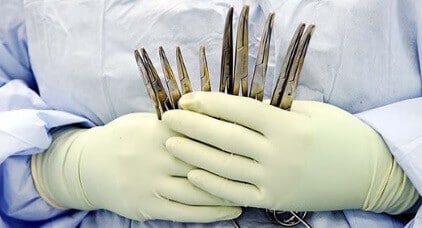THOUSANDS of Australians are believed to be having unnecessary knee surgery despite evidence it could lead to life-threatening complications.
Research published in The Medical Journal of Australia today found that while several studies over the past decade had concluded arthroscopies were ineffective for osteoarthritis of the knee, Victorian surgeons continued to use the procedure on tens of thousands of patients.
Lead author Dr Megan Bohensky said about 8000 people had had the surgery in Victoria every year despite a 2002 trial showing arthroscopies were no better than placebo surgery in 180 patients.
That study, published in the prestigious New England Journal of Medicine, found no difference in pain and function in the two years after surgery.
Another study published in 2008 found arthroscopies offered no benefit over non-surgical treatments for osteoarthritis of the knee, and several systematic reviews since then backed this conclusion.
Dr Bohensky, of the Monash University centre of research excellence in patient safety, said although there was a temporary decrease in the rate of procedures being done in Victoria after the 2002 study, the trend was not sustained, suggesting surgeons rejected the findings.
An arthroscopy is a minimally invasive procedure involving the insertion of a camera and instruments into the knee joint to examine and repair it. Potential complications include nerve damage and life-threatening infections and blood clots.
In a review of this latest Victorian research, Melbourne rheumatologist Rachelle Buchbinder and Sydney orthopaedic surgeon Ian Harris said it showed ”the use of arthroscopy for knee osteoarthritis has been allowed to continue, exposing patients to an intervention that is at best ineffective, and at worst, harmful”
The pair said it had been ”difficult to shift the convictions of many surgeons” who probably had ingrained beliefs the surgery worked. However, they said financial incentives and patient expectations might also be at play.
Professor Harris said although he had stopped using the procedure, many surgeons might not appreciate the strength of the evidence against it. While it could help patients with loose matter in their knees, he said it would not provide lasting relief for ”the vast majority of patients”.
”When you think about it, it doesn’t make sense. Osteoarthritis is a degenerative wearing away of the lining of the knee, so sticking a camera in there and washing it out or shaving further cartilage away from the knee doesn’t reverse that problem. It’s still going to wear away just as fast,” Professor Harris said.
Dr Bohensky said given the lack of evidence for the procedure, GPs should encourage patients with osteoarthritis of the knee to try non-surgical treatments first.


